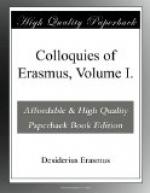Fa. Is it not at its own Disposal, while it is in the Body?
Eu. No indeed, except something happen beside the common Course of Nature.
Fa. In Truth, instead of one Soul you have given me a great many; an animal, a vegetative, a sensitive, an intelligent, a remembring, a willing, an angry, and desiring: One was enough for me.
Eu. There are different Actions of the same Soul, and these have different Names.
Fa. I don’t well understand you.
Eu. Well then, I’ll make you understand me: You are a Wife in the Bed-Chamber, in your Work-Shop a Weaver of Hangings, in your Warehouse a Seller of them, in your Kitchen a Cook, among your Servants a Mistress, and among your Children a Mother; and yet you are all these in the same House.
Fa. You philosophize very bluntly. Is then the Soul so in the Body as I am in my House?
Eu. It is.
Fa. But while I am weaving in my Work-Shop, I am not cooking in my Kitchen.
Eu. Nor are you all Soul, but a Soul carrying about a Body, and the Body can’t be in many Places at the same Time; but the Soul being a simple Form, is so in the whole Body, tho’ it does not act the same in all Parts of the Body, nor after the same Manner, how differently affected soever they are: For it understands and remembers in the Brain, it is angry in the Heart, it lusts in the Liver, it hears with the Ears, sees with the Eyes, smells with the Nose, it tastes in the Palate and Tongue, and feels in all Parts of the Body which are adjoined to any nervous Part: But it does not feel in the Hair, nor the Ends of the Nails; neither do the Lungs feel of themselves, nor the Liver, nor perhaps the Milt neither.
Fa. So that in certain Parts of the Body it only animates and vegetates.
Eu. It should seem so.
Fa. If one and the same Soul does all these Things in one and the same Man, it follows of Consequence, that the Foetus in the Womb of the Mother, both feels and understands, as soon as it begins to grow; which is a Sign of Life, unless a Man in his Formation has more Souls than one, and afterwards the rest giving Place, one acts all. So that at first a Man is a Plant, then an Animal, and lastly a Man.
Eu. Perhaps Aristotle would not think what you say absurd: I think it is more probable, that the rational Soul is infus’d with the Life, and that like a little Fire that is buried as it were under too great a Quantity of green Wood, it cannot exert its Power.
Fa. Why then is the Soul bound to the Body that it acts and moves?
Eu. No otherwise than a Tortoise is bound or tied to the Shell that he carries about.
Fa. He does move it indeed; but so at the same Time that he moves himself too, as a Pilot steers a Ship, turning it which Way he will, and is at the same Time mov’d with it.




